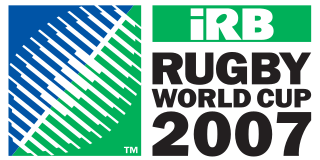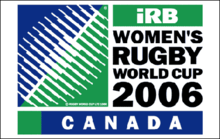
The Rugby World Cup is a men's rugby union tournament contested every four years between the top international teams, the winners of which are recognised as the World champions of the sport.

The 2007 Rugby World Cup was the sixth Rugby World Cup, a quadrennial international rugby union competition organised by the International Rugby Board. Twenty nations competed for the Webb Ellis Cup in the tournament, which was hosted by France from 7 September to 20 October. France won the hosting rights in 2003, beating a bid from England. The competition consisted of 48 matches over 44 days; 42 matches were played in 10 cities throughout France, as well as four in Cardiff, Wales, and two in Edinburgh, Scotland.
The Churchill Cup was an annual rugby union tournament, held in June, contested by representative men's teams from Canada, England, the United States, and other invited teams from a wide array of countries.

Rugby World Cup Sevens (RWCS) is the quadrennial world championship of rugby sevens, a variant of rugby union. Organised by World Rugby, it currently consists of men's and women's tournaments, and is the highest level of competition in the sport outside of the Summer Olympics.

The 2011 Rugby World Cup, was the seventh Rugby World Cup, a quadrennial international rugby union competition inaugurated in 1987. The International Rugby Board (IRB) selected New Zealand as the host country in preference to Japan and South Africa at a meeting in Dublin on 17 November 2005. The tournament was won by New Zealand, who defeated France 8–7 in the final. The defending champions, South Africa, were eliminated by Australia 11–9 in the quarter-finals. The result marked the third time that the tournament was won by the country that hosted the event.

The IRB2015 Rugby World Cup was the eighth Rugby World Cup, the quadrennial rugby union world championship. The tournament was hosted by England from 18 September to 31 October. Of the 20 countries competing in the World Cup in 2011, there was only one change: Uruguay replaced Russia. This was the first World Cup with no new teams to the tournament.

The women's Rugby World Cup is the women's rugby union world championship which is organised by World Rugby. The first Rugby World Cup for women was held in 1991, but it was not until the 1998 tournament that the tournament received official backing from the International Rugby Board ; by 2009, the IRB had retroactively recognized the 1991 and 1994 tournaments and their champions.
The 2002 Women's Rugby World Cup was the second World Cup fully sanctioned by the sports governing body the International Rugby Board (IRB). The tournament was held in Barcelona, Spain. The format was the same as the previous tournament and again 16 nations competed.
The 2010 Women's Rugby World Cup was the sixth edition of the Women's Rugby World Cup and was held in England. The International Rugby Board Executive Committee selected the host union following a recommendation from the Rugby World Cup Limited board after considering bids from the Rugby Football Union and the German Rugby Union – it had been England's third successive bid after being rejected in 2002 and 2006. The tournament was again being organised by the International Rugby Board (IRB) as opposed to the host union, and included five matches for all teams played on 20, 24, 28 August and 1 and 5 September. In May 2009 it was announced that the semi-final, 3rd place play off and final would take place at The Stoop and not Twickenham as had previously been suggested. Pool games were held at the Surrey Sports Park in Guildford.

The International Rugby Board (IRB) awarded the 2007 Under 19 Rugby World Championship to the Irish Rugby Football Union (IRFU) and the Ulster branch hosted it. The Tournament, which took place in Belfast, Northern Ireland from 4–21 April, was split into two divisions of twelve teams. Division A games took place in Belfast at Belfast Harlequins' Deramore Park, Ulster Rugby's Ravenhill Stadium, and Cooke RFC/Instonians' Shaw's Bridge complex. Division B games were held in Queen's University of Belfast's The Dub complex and Malone RFC's Gibson Park in Belfast, and Bangor RFC's Upritchard Park in Bangor.

The 2019 Rugby World Cup was the ninth edition of the Rugby World Cup, the quadrennial world championship for men's rugby union teams. It was hosted in Japan from 20 September to 2 November in 12 venues all across the country. The opening match was played at Ajinomoto Stadium in Chōfu, Tokyo, with the final match being held at International Stadium Yokohama in Yokohama. This was the first time that the tournament had taken place in Asia and outside the traditional Tier 1 rugby nations.

The 2014 Women's Rugby World Cup was the seventh edition of the Women's Rugby World Cup, and the sixth held in Europe. The World Cup Final took place on 17 August.
Sarah Corrigan is an Australian international rugby union referee.
The qualification process for the 2015 Rugby World Cup began during the pool stages of the 2011 tournament in New Zealand, during which the top three teams from each of the four pools were awarded automatic qualification for the 2015 event. A further eight teams qualified through regional tournaments and the repechage process. The tournament was held in England; it began on 18 September 2015 and finished on 31 October.

Sandrine Agricole is a French female rugby union player. She represented France at the 2010 and the 2014 Women's Rugby World Cup. In 2014, she was named World Cup Dream Team as flyhalf. Agricole started playing rugby since she was 11 years old.

The 2017 Women's Rugby World Cup was the eighth edition of the Women's Rugby World Cup and was held in Ireland in August 2017. New Zealand became the 2017 champions by beating England 41–32 in the final on 26 August. Matches were held in Dublin and Belfast. The pool stages were held at University College Dublin with the semi-finals and finals held at Queen's University and Kingspan Stadium in Belfast.

The 2021 Rugby World Cup was the ninth staging of the women's Rugby World Cup, as organised by World Rugby. It was held from 8 October to 12 November 2022 in Auckland and Whangārei, New Zealand. It was originally scheduled to be held in 2021, but was postponed by one year due to the COVID-19 pandemic.
The 2014 Women's Rugby World Cup Final was the final match of the 2014 Women's Rugby World Cup, played between former champions England and first-time finalists Canada on 14 August 2014 at Stade Jean-Bouin in Paris. England won the game and the World Cup for a second time, beating Canada 21–9.
The 2006 Women's Rugby World Cup Final was a rugby union match that determined the 2006 Women's Rugby World Cup winner. The match took place on 17 September 2006 at the Commonwealth Stadium in Edmonton, Canada. It was contested between New Zealand and England for the second time in a row. It was England's fourth appearance in a Final and New Zealand's third. New Zealand won their third consecutive title after beating England 25–17.
The qualification process for the 2010 Women's Rugby World Cup began on 6 February 2009. A total of 12 teams qualified for the tournament, which was held in England between 20 August – 5 September 2010.












